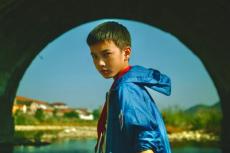『郊外の鳥たち』チウ・ション監督インタビュー/Interview with Qiu Sheng about “Suburban Birds”
NeoL / 2023年3月17日 17時0分
中国第8世代の新たなる才能、チウ・ションの長編デビュー作「郊外の鳥たち』が3月18日より、シアター・イメージフォーラム他にて全国公開される。地盤沈下が進み《鬼城》と化した中国地方都市の地質調査に訪れた青年ハオは、廃校となった小学校の机の中から、自分と同じ名前の男の子の日記を見つける。そこに記録されていたのは、開発進む都市の中で生き生きと日常を謳歌する子どもたちの姿だった。それは果たしてハオの過去の物語なのか、未来への預言なのか─やがて子供たちは、ひとり、またひとりと姿を消していく。パラレルに進行する二つの物語によって生じる時制のズレを、まるで同じ地平性を歩いているような感覚で表現する斬新なスタイルで世界から注目。「“スタンド・バイ・ミー” meets カフカの“城”」と評された本作を送り出した新鋭にインタビューを試みた。
→ in English
――監督は本作を「記憶の探究に関するSF映画」と考えているとおっしゃっていました。まず、このアイデアはどのように思いついたのか。また、過去と未来の人々が同じ場所で何かを探しているという物語の根底をなすロジックについてお話を聞かせてください。
チウ・ション監督「この映画のプロットは、杭州のとある場所にインスパイアされています。南宋王朝の都であった杭州には宗時代を再現したテーマパークがあります。そして、その通りの下には、南宋の皇帝が街を出るために使った道があるのです。その通りからは、清王朝の街並み、元王朝の街並み、宋王朝の街並みが重なり合っているように見える。このように、過去と現在が共存し、並行して存在しているように見える場所からインスピレーションを得て、子どもと大人の時間と空間が並行しているような世界を構築しました。お互いに交差する部分がありますが、それは平行構造なのです。なぜSF映画なのかと言うと、2つのパートの間の時空は、量子もつれ(粒子同士に強い結びつきができ、お互いのことがわかる状態。片方が変化するともう片方にも瞬時に変化が生じる)のように見えるからです。つまり、自分の時空が少し変化すると、他の時空の繋がりも変化します。例えば、大人が誤って望遠鏡を落とした場合、その望遠鏡は子どもによって拾われます。その後、望遠鏡は子どもたちの間で一種のスパイ行為と疑惑を引き起こすことになった。そういったことが私のアイデアの源です」
――確かに作中では望遠鏡や鏡などのツールが差し込まれ、両者の間に絶え間ない観察が行われていることが窺えますし、過去と未来が相互に関係しあうことを反映しているように見えます。
チウ・ション監督「ええ。両者は同じ時空の両面のような繋がりがあり、それを表現するために脚本を書く過程で少しずつ示唆する事柄を積み上げていく必要がありました。例えば、望遠鏡の部分は、自分が景色を見ながら望遠鏡を手に取った経験を基にしています。そこから、望遠鏡が実はトンネル的な役割を持っていて、その先で2つの世界が繋がるという構想が浮かびました。また、実際に杭州は地下鉄の駅を作ろうとしていたんですね。建設中に、過去の遺跡から興味深いものが掘り出され、地下水の漏れを引き起こし、他にも事故が起きています。これらのニュースも着想源となっています」


――このようにランダムに断片を散りばめていくということも最初から意図していたのでしょうか。それとも撮影の過程とともにこの形になっていったのでしょうか。構想を練り上げて実験的な映画を作るということについて教えてください。
チウ・ション監督「すべての映画はある意味でドキュメンタリーであり、制作過程における感情および心理的な変化の記録だと思っています。制作時の私はオープンマインドで、その期間内に得たメッセージとインスピレーションを全て作品に注ぎ込みました。今よりもっと大胆にね。これは私の初の長編映画で、制限はありませんでしたから、自分が持つすべての新鮮なアイデアを注ぎ込んだんです」
――俳優の感情を引き出しパフォーマンスしてもらうために、どのようなコミュニケ―ションをとりましたか。
チウ・ション監督 「俳優とのコミュニケーションはゲームをプレイするようなものなんです。適切な言語を使い、挑戦的な目標を与えると、彼らは今まで見たことのないようなパフォーマンスを披露してくれます。 『嬉しい』『怒っている』『悲しい』などのありふれた言葉で指示を出すだけでは、何千回トライしても到達できないかもしれないパフォーマンスを見せてくれるんですよ。主人公が誕生日にケーキを見たシーンでは、彼の中に非常に複雑な感情がありましたよね。私が彼に言ったことの一つは、『ケーキのろうそくを見つめるとき、人生で初めて火を見たように振る舞ってほしい』ということでした。喜びや悲しみといった言葉は具体的ではないと思うので、感情の本質を伝えるためにメタファーを使ったのです」
――言葉の使い方はあなたのクリエイションにとって非常に重要なのですね。この映画での弁証法的言語の使用でもそう感じます。
チウ・ション監督 「言葉は正確でなければならないと思います。正確な言葉を通せば、映画は観客とより正確なコミュニケーションを図ることができ、撮影の意図や効果も伝わりやすくなります。映画内の言葉は、映画における対話の役割を担っているのです。映画でのセリフと演劇でのセリフとは違うと私は思っています。演劇では言葉の美しさ、または文学的な性質が強調され、映画ではより対話的な効果が強い。映画では声のトーンや強さ、イントネーションなどで表現されるものが多々あります。ですから、役者のセリフを演出するにあたって、声やイントネーションなどに気をつけました。方言を使うのも一つの手段です。俳優が慣れない方言で話すとき、彼らは単語やその意味より、感情やイントネーションというフィーリング的なものに注意が向きますから」

――なるほど。とても興味深いです。『郊外の鳥たち(Suburban Birds)』という作品名を聞いて、都市の拡大と郊外の衰退について考えさせられました。この題名にしたのはなぜでしょうか。
チウ・ション監督 「一つには、あなたがおっしゃったように、郊外、そして中間地点という意味があります。都会の鳥ではなく、野生の鳥でもない何か。前進も後退もできず、自分の位置を見つけられない状態にあるものです。現代の中国語からしたら、この言葉は文学的にはでちょっと変なところがあるのですが、この少し大きくて聞き慣れない言葉をあえてタイトルにしたいと思いました」
――本作には非常に強い違和感がありますね。たとえば主人公は環境に慣れていない、つまり快適ではない状態ですが、探求心や好奇心も感じさせます。このタイトルは、そうしたことも反映していると思います。
チウ・ション監督 「メイソン・リーを主役に選んだことは大きかったと思います。彼はアメリカで育ったため、中国にあまり詳しくなかった。私は彼がこの環境に慣れていないことを利用したんです。初めて会ったのは北京でしたが、彼は少しぎこちなく、そして周りに関心があるようでした。杭州にも詳しくなかったので、好奇心たっぷりでまっさらの目線で見ていたのを利用したんです。さらに、バックグラウンドの大きく異なる俳優を何人か選びました。彼らのうちの何人かは長年業界にいて、いつものやり方で演技した人もいるかもしれません。一方で経験の少ない新人俳優もいます。演技をするとき、そういう多種多様な人たちが集まっているがゆえの距離感や居心地の悪さゆえの美しさを生み出していました」

――先ほど、どの映画も制作過程の感情などを記録する一種のドキュメンタリーであるとおっしゃっていました。自分の記憶や感情を辿る時、恐怖や現実から切り離されたような感覚がありましたか。製作の過程でどのような感情が湧いたのでしょう。
チウ・ション監督 「記憶を辿り始めたときは、どのような結論になるかわかっていませんでした。でも脚本を書いたり撮影したりしてわかったのは、私のアバターである主人公が、子ども時代の友人の失踪に関して何かしらの過ちをおかしていること。もしかしたら彼は殺人犯の一人かもしれません。だから、私の映画での全てのアクションは、一種の償いであり救済なのです。ラストの、2人の男性が森に戻り、方言で話し、鳥を取り戻そうとしている部分はより明確に贖罪を試みたものです。失われたものを取り戻そうとしていて、調和された形で終わるんです。このイメージは直感的に浮かんだもので、最初は意味がわかりませんでした。でも撮影をしてみて、それが贖いのようになっているとはっきりと感じました」
――どのような個人的な経験がこの映画の制作に繋がったのか、もう少し詳しく教えてください。
チウ・ション監督 「私の子ども時代です。故郷を離れた後、私は過去の生活から切り離されました。小学校の友達や同級生と疎遠になり、断絶された感覚がありました。一方で、私自身と私のあり方が本作に繋がっているとも思います。大人になった私は、映画の主人公のように自分が毎日行っていることの意味を疑問視することがよくあります。目標や方向性が見つからないと。そうした意味でカフカという作家が特別に好きなのです。カフカの小説を読むたびに、ある日突然目が覚めると虫になっていて、世界に投げ出されるその存在が自分自身のようだと感じます」



――では、このように過去と未来を見る映画を作ったことで、答えや解決策を見つけたり、自分自身と和解に至ることができましたか。
チウ・ション監督 「私にとって、それは発見と救済のプロセスでした。私にとって映画は観察の手立てであり、癒しの手立てでもあり、とても大切なものなんです。映画を作ることは、現実と並行する宇宙を作り出すこと。その関係は本作における大人と子どもの関係のようなものかもしれません。それらは互いに繋がっていて、現実の世界について多くの新しい洞察を得たり、逆に映画の世界での新しいインスピレーションを得ることができたりします」
――最後に、この作品における、子ども時代についてあなたの見解を聞かせてください。
チウ・ション監督 「子ども時代は希望に満ちていますが、同時に喪失の始まりでもあります。得るものと失うものが両方ある時期です。子ども時代には罪悪感を感じずに行っていたことが多々あり、大人が思うよりはるかに複雑な時期ではないでしょうか。私の作品でもそのことについて反芻したかったんです。でも自分の子ども時代の記憶を探ると、今の心の状態を反映して、現実とは異なっている可能性があると思うんですよね。私は以前受けたインタビューで、失われた楽園だけが本当の楽園なのだと言いました。失われてから、一つ一つ美しいものを加えていくから。子ども時代が美しいのは喪失の予兆が含まれているからです。この映画では、太陽が沈む様を描いていて、その後、目の前に道があらわれます。そして道の果てでは、時間と空間が終わりを迎えた感覚を与えます。これが私にとっての中間点です。あなたはそこで自問するんです、いつ大人になるのか、と。現実でも、杭州のこの道の終わりを辿ることは不可能なんですよ。幼年期は橋の下、成人期は橋の上に立っているように見えますが、橋の下から橋の上へ行く途中は途切れていて、実際に過去と現在の間にも途切れが生じている。ですから、私たちは常に振り返る必要があるんだと思います。何かを理解するためには、常にこういう振り返りが必要なのです」

text Baihe Sun(IG)
STORY
地盤沈下が進み《鬼城》と化した中国地方都市の地質調査に訪れた青年ハオは、廃校となった小学校の机の中から、自分と同じ名前の男の子の日記を見つける。そこに記録されていたのは、開発進む都市の中で生き生きと日常を謳歌する子どもたちの姿だった。
それは果たしてハオの過去の物語なのか、未来への預言なのか─
やがて子供たちは、ひとり、またひとりと姿を消していく。
『郊外の鳥たち』
2023年3月18日(土)よりシアター・イメージフォーラムほか全国順次公開
https://www.reallylikefilms.com/kogai
チウ・ション 仇晟 作品
出演:メイソン・リー 李淳 / ホアン・ルー 黄璐 / ゴン・ズーハン 龔子涵 他
音楽:シアオ・ホー 小河 撮影: シュー・ランジュン 徐燃俊
編集:ジン・ディー 金鏑 / リアオ・チンスン 廖慶松
美術監督:ユー・ズーヤン 於子洋 録音: ロウ・クン 娄堃 音響デザイナー:トゥー・ドゥーチー 杜篤之 音響編集: ウー・シューヤオ 呉書瑶
[ 2018年中国映画 | 114分 | 中国語 |1:1.33 | 5.1ch | DCP・Blu-ray ]
字幕翻訳 : 奥原智子 宣伝デザイン : 内田美由紀(NORA DESIGN) 予告編 : 株式会社ロックハーツ
配給 : リアリーライクフィルムズ + ムービー・アクト・プロジェクト 提供 : リアリーライクフィルムズ
©️BEIJING TRANSCEND PICTURES ENTERTAINMENT CO., LTD. , QUASAR FILMS, CFORCE PICTURES, BEIJING YOSHOW FILMS CO., LTD. , THREE MONKEYS FILMS. SHANGHAI, BEIJING CHASE PICTURES CO., LTD. ,KIFRAME STUDIO, FLASH FORWARD ENTERTAINMENT / ReallyLikeFilms

――You mentioned that you think of this movie as a science fiction film and that it is about an investigation of memory. How did you come to this idea, and what is the fundamental logic for your narrative that involves two groups of people, one from the past and one from the future, in search of something in the same place?
Sheng: I was inspired by a place in Hangzhou for the plot of this film. There is an attraction in Hangzhou, the Imperial Street of the Southern Song Dynasty. At the bottom of that street was a road that the emperor of the Southern Song Dynasty used to exit the city. And from that street, digging down from the surface of this modern season, you can see the streets of the Qing Dynasty, the streets of Yuan Dynasty, and the streets of Song Dynasty, they are all stacked on top of each other. Then this gave me the inspiration to say that the past and the present seem to co-exist, that they exist in parallel, so I constructed a time and space in which the children and the adults in this time and space are in parallel. I have that part of the intersection between each other, but it is a parallel structure. Why is it a science fiction film? Because I think the relationship between the two parts of space-time seems to be a quantum entanglement relationship. That is, a small change in my space-time will cause a change in the linkage of the other space-time, for example, when adults accidentally fall and dropped the telescope, that telescope will be picked up by the children. Then, the telescope seems to have led to a kind of spying and suspicion between the children. That's the source of my idea.
――You say that this is a kind of excavation of memory, and in the process of excavation, it will also form a kind of interference with reality. In essence, the film is a kind of constant observation, including your design of these objects, like telescopes and mirrors, which are all observation tools, reflecting a mysterious interaction between the past and the future. What difficulties did you encounter during the shooting process to illustrate such mysterious sensations of time and space?
Sheng: Well, yes, in fact, they are connected to each other like two sides of the same thing. In the process of writing the script, I had to build up little by little. For example, the telescope part was based on my own experience in picking up a telescope when I was looking at the scenery. And that telescope gave me a lot of inspiration. Then I thought of connecting two different times and space through the telescope. The telescope was actually a tunnel, and I was able to connect two worlds at the end of the telescope. Some of the inspiration came from some news, for example, Hangzhou had been building a subway station for a while, and during the construction time, they dug out some interesting things, such as some objects from past ruins, and caused a groundwater leakage and other accidents. This news is also some of my sources of inspiration.


――Was this randomness, this fragmentation part of your plan from the beginning? Or was it something that you kept putting together during the shooting process? What is your idea of making an experimental film like that in which the envision is always being crafted as you go along?
Sheng: I think to a certain extent, all films are documentaries, a record of emotional and psychological changes in the process of creation. So, I was open-minded at that time. I put in all the messages and inspirations I received in the process. Of course, at that time, I was also more daring. It was my first film and there were no restrictions. I just put all the fresh ideas into it. I think of the characters as groups are also like a small team or a film crew. They went to do that investigation like film shooting.
―― What are some surprises that happened while you were shooting?
Sheng: In fact, there is a lot of improvisation and a lot of surprises in the process. For example, there is a shot in the film is when they are under the bridge, and there is light reflected from the mirror side of a train. In that shot, I let the crew put the mirror on that side to reflect light onto the opposite side of the railway, and then we shot a dozen shots but they all failed. But in the last one, suddenly, when I shouted “action”, a train was just passing, and we had the perfect shot of the reflection. At that moment, it feels like a godsend message from heaven. As if you have everything ready, waiting for a miracle to come, and then a miracle came. This is the feeling.
――That is wonderful. I am also wondering how you communicate with the actors. How do you guide them in bringing out the intrinsic feelings in their performances?
Sheng: Communication with the actor is sometimes like playing a game. You give them some challenging goals using the right language. They will then give out a performance you have not seen before. Because if you just give them instructions in cliche words like “happy”, “angry”, or “sad”, they may have done it a thousand times, and may not be able to make that happen in a new scene. I remember clearly, shooting the main character's birthday scene when he saw the cake, there are very complex emotions within him. One of the things I said to him at the time was, “when you stare at the candle on the cake, act as if it’s like seeing fire for the first time in your life.” I used a metaphor to tell him the essence of the feeling because I think words like “joy” or “sadness” is not specific enough to be performed.


―― It seems like the use of language is crucial to your creation. Even the use of dialectic language in this film. Can you share more about your thoughts on that?
Sheng: I think first of all, my language is in the script as the preliminary communication, I think the language must be accurate. It has to be through accurate language for the film to be able to achieve a kind of communication that is more precise and to be able to achieve the effect of my shooting. The cinematic language is the role of dialogue in the film. I'm skeptical. I don't think the dialogue in a film is like the dialogue in a play. It's through the beauty of the language, or the literary nature of the language, I think it's more of a dialogue. In the film, the tone of voice, the intonation, and the intensity of the voice express something. So, in directing the actors' dialogues, I may be more concerned about his voice, intonation, and these things, using dialect is also a means. That is, when these actors speak in a dialect they are not familiar with, they pay less attention to the word, and what the word means, but to a kind of emotion and intonation that is closer to the feeling.
――And what made you decide on the title of the movie? The “Suburban Birds” has a sense of power dynamic in the words themselves. It makes me think about the expansion of the city and the decay of the suburban area in contrast. What is the meaning of the title for you?
Sheng: Yes, on one hand, as you said, it’s the suburbs, it's kind of the middle ground. Something that is not a bird in the city, and not a bird in the wild. It is a kind of state that has no space for advance or retreat, and it does not find its own position. The bird of the suburbs has a little bit of awkwardness in its literary sense if we think of a trace of modern Chinese vernacular. I wanted to use this slightly larger unfamiliar meaning of the words as the title of the film.
―― There is a very strong sense of strangeness in the film, for example, the actor is kind of unfamiliar with the environment, that is, similar to a sense of discomfort, but he also brings a sense of exploration or curiosity. I think this title is more in line with that. How did you come to the accomplishment of that?
Sheng: I think my decision of choosing Mason Chun Lee is quite important. I took advantage of his unfamiliarity with this environment. Because Chun Lee grew up in the United States, and he was not very familiar with China. When I first met him, we met in Beijing, I could feel that he was a little bit unfamiliar and curious about his surroundings. He was also not familiar with Hangzhou, so he looked at everything in Hangzhou with a curious and unfamiliar perspective, so I also took advantage of this feeling. The other thing is that we chose several actors, and their backgrounds are very different. Some of them may have been in the industry for many years, and then acted in a more usual way. There is also a new actor who does not have much experience in acting. In the performance, these people were put together, and it created this kind of distance and the beauty of awkwardness.
―― What is the most difficult thing you have done during the process of shooting?
Sheng: We spent a total of 38 days shooting this film, the time schedule was very tight, and we had to shoot four to five scenes a day, we encountered a relatively large problem in the use of the lens. We had to have some mastery of the rhythm of the zoom lens, and we failed multiple times. Then we were able to slowly adapt. And I remember another difficulty that was caused by a more external factor. There was a scene in the subway tunnel, but the tunnel was still under construction. The tunnel was blocked by a gigantic piece of hard rock and we couldn’t proceed because of that. Then this time our shooting was almost over. We were very anxious. And on the last day of our shooting, the tunnel was dug through, and then we immediately went in to shoot the tunnel. That was like another miracle.


―― Another hard question on the making of the film. When you were investigating your memories, because making a film is the action of focusing the camera on one particular reality, and then making an observation or investigation of it, do you feel that living through that experience is similar to a documentary film? What is the new experience you had in the creation of this film? When you put yourself in such a strange perspective, did you feel a sense of fear and disconnection from reality? For example, when you are staring into the abyss, the abyss is also staring at you. What kind of emotion do you feel when you are doing an investigation of your memories?
Sheng: It does have this feeling of a story within a story as if our shooting itself is a dramatic event. Like you just said. In fact, when I started to investigate the memories, I didn't make any predetermined conclusions. But through the writing and shooting of the script, I found that the protagonist, as my avatar, is guilty of the disappearance of his childhood friend. Or maybe he is one of the murderers. I think the whole action of my film is a kind of compensation or a kind of redemption. The last part of my film is more of an attempt at redemption, that is, the two men are back in the woods, speaking in dialect, and trying to get the bird back. There is an attempt to recover the lost thing. This investigation of memories eventually becomes a kind of reconciliation. I first saw this image in my intuition, but I didn't know what it meant at first. Then when I had the cinematic shot, I felt more clearly that it did seem to be a kind of redemption.
―― Continuing on what you are saying, I would like to ask you about how the visuals and the cinematic language have an impact on your understanding of your script. Do you get to have a deeper and new understanding of what you wanted to express and communicate with the audience when you translate and transform your thoughts into moving images/films?
Sheng: Yes. Visuals have a strong impact on my understanding and my creation. For example, when I first wrote about a group of children in the woods, they used this red scarf to tie up the tree branches, and then I found that the long pole itself had a sense of beauty in it. This long pole seems to be the unveiling of the pole, like a peasant uprising. The unveiling of a flag. So I would shoot with a camera to follow the process of marching. I think the pole seems to mean that they seem to unite together to do something almost heroic. Many of the props I think are designed as if they are a pipe that is used to connect the past with the future. And the candle is similar to a kind of light in memory, that is to say, used to illuminate something that is not normally visible.
―― By looking at the past and the future in this way, were you looking for an answer or a solution? Did you come to a reconciliation with yourself in the process? How did this film impact you in your life?
Sheng: For me, it was a process of discovery and redemption. Film for me is a tool for observation and a tool for healing. For me, it is a particularly important presence. Making a film creates a universe that is parallel to reality. Film and reality are not in the same orbit, but the relationship between them may be like the relationship between adults and children in my films. They are connected to each other, and then I can gain a lot of new insights about the real world or some new inspirations in the world of film.


―― Your film has been shown around the world. Would you share some important feedback you have gotten from the audience?
Sheng: I previously thought that this film should be very intuitive. It should be able to bring the audience a very direct feeling, but then many viewers actually responded that they could not understand the film. I am still a little disappointed, maybe I have set too many puzzles to generate this confused feeling. But there are wonderful things to think about, too. For example, when my film was first shown in Switzerland, an old lady came up to me and said that the film reminded her of her distant childhood, probably in the 1930s. Then I felt so touched. Then someone also said that there was a screening in Beijing before. Another old lady stood up and said that the scene of the children in the river made her think about the environment and how it has changed since she was a child. I think it's interesting that the feedback is from their own personal perspective, but in a sense, it's also a collective memory, a universal relationship with our childhood. I have come to the understanding that the film allows the audience to actually travel through the ages.
―― And what is your understanding of childhood, especially in this work?
Sheng: On the one hand, I think childhood is full of hope, but it is also the beginning of loss. Childhood is a time of both gain and loss. When you do those things in childhood, you may not feel any guilt, but it is a far more complicated period than we think. My film also wants to ruminate on that. On the other hand, I think that when you search for your childhood in memory, it will cause many changes, and it can be a reflection of our current state of mind. I said in the previous interview that the only real paradise is the lost paradise, that is to say, we always modify childhood as a kind of lost paradise. Then step by step, we add beautiful things to it. But in fact, the beauty of childhood contains the omen of loss in it. The movie depicts the sun going down, and then the road is in front of them. At the end of the road, there is a feeling that time and space have come to an end. And then this is a midpoint of childhood for me, you ask yourself, when does it become adulthood? In fact, this point in time seems to be untraceable. It seems that childhood is standing under the bridge, and adulthood is on top of the bridge, and there is a break in the middle from under the bridge to on top of the bridge, and this break actually occurs between the past and the present. So we always need to look back, and we always need this kind of retrospection to figure out something.
―― What kind of personal experience in your life led you to the making of this film?
Sheng: My childhood. After I moved out of my hometown, I was basically disconnected from my past life. I was disconnected from my elementary school friends and classmates, and there was a particularly clear sense of disconnection. On the other hand, I think what is more relevant to me personally is myself and my own being. I often feel related to the protagonist in the film as an adult, questioning the meaning of what I do every day. I can't find that kind of goal and direction. There is a writer I particularly like. Kafka. Every time I read Kafka's novels, I feel that I can read myself as if one day I suddenly become awake and I would suddenly become a beetle, and then be thrown by the world by being one with it.
―― Thank you so much for this conversation and the amazingly beautiful film.
Sheng: Thank you.

text Baihe Sun(IG)
関連記事のまとめはこちら
https://www.neol.jp/movie-2/
外部リンク
この記事に関連するニュース
-
UESHIMA MUSEUM ANNEX オープンのお知らせ ~ 2025年1月15日より、今津景展を開催
PR TIMES / 2024年12月23日 15時15分
-
Shareholder Proposals to Japan Business Systems, Inc.
PR TIMES / 2024年12月22日 14時40分
-
【愛しとーと】国際機関ESQRの品質優秀ダイヤモンド賞「Quality Choice Prize 2024」を受賞!
PR TIMES / 2024年12月20日 13時45分
-
日本フレスコボール協会(JFBA)、スピードガンを用いた得点集計システム"HAYABUSA Pro"の完成を発表。2025年より国内ツアーに導入することを決定。<English Follows>
PR TIMES / 2024年12月9日 17時15分
-
外国人向け日本生活支援プラットフォームをローンチ
PR TIMES / 2024年12月6日 17時45分
ランキング
-
12025年は寒波到来「これを買えば間違いなしの防寒靴」4選。“真冬でも寒さ知らず”のスニーカーも
日刊SPA! / 2025年1月1日 15時51分
-
2助手席で「絶対やっちゃダメーっ!」 意外に「やりがち&無意識」の行動もある? ドライバーが“メチャ嫌がる行為”5選
くるまのニュース / 2025年1月1日 18時10分
-
3メルカリで販売価格から送料を引いたらマイナスに……この場合送料はどうなりますか?
オールアバウト / 2024年12月31日 21時5分
-
4知らないと「免許返納」ですよ!? 道路にある謎の「青い斜めライン」の重要すぎる意味とは 無視したら「あおり運転」の被害にも!? 何を注意すべきなのか
くるまのニュース / 2024年12月30日 21時10分
-
5「なりたい顔」ランキング 10代のあこがれの的は橋本環奈さん 40代が支持するのは不動のクールビューティー
まいどなニュース / 2025年1月1日 16時30分
記事ミッション中・・・
記事にリアクションする
![]()
記事ミッション中・・・
記事にリアクションする

エラーが発生しました
ページを再読み込みして
ください











